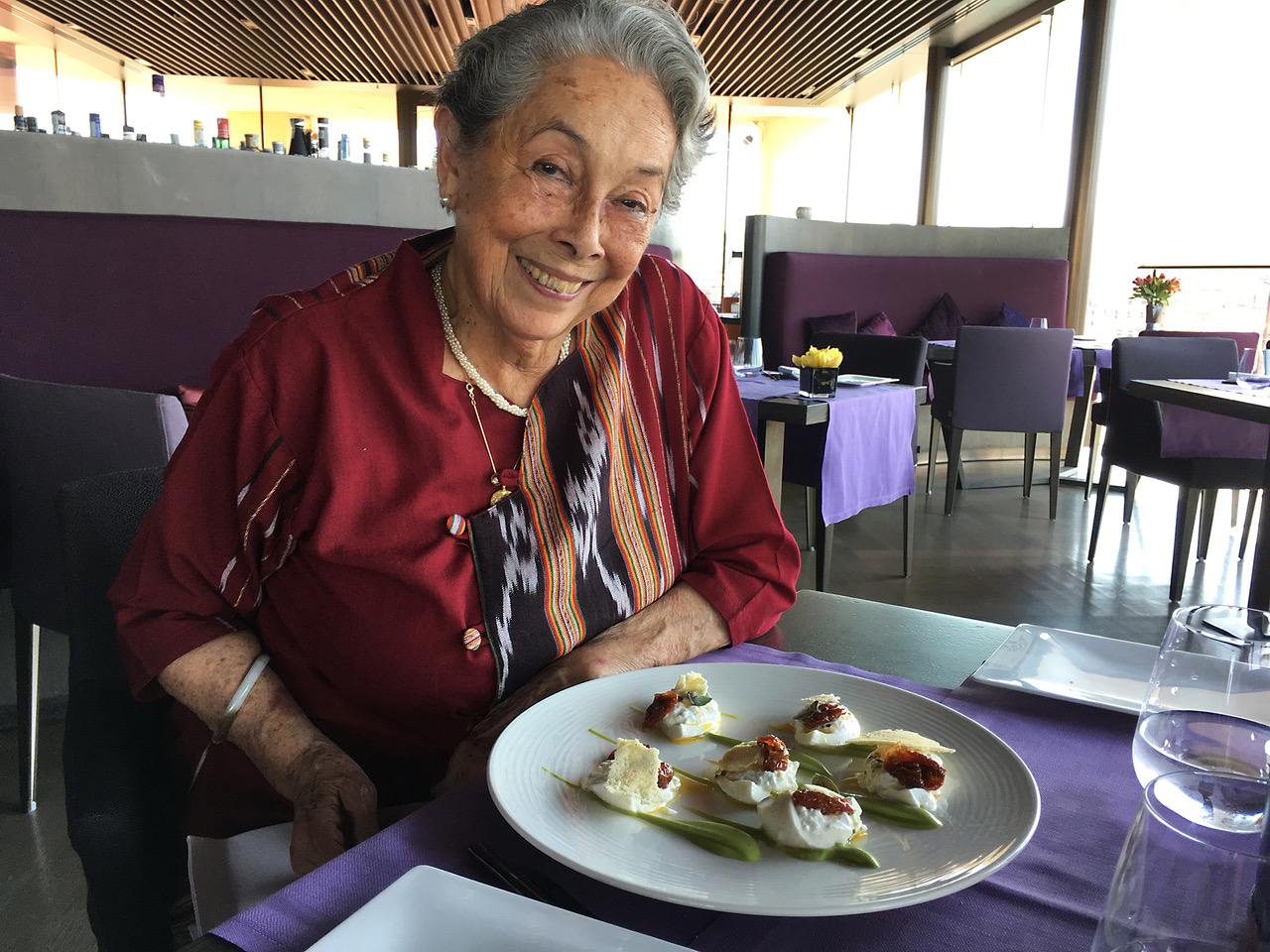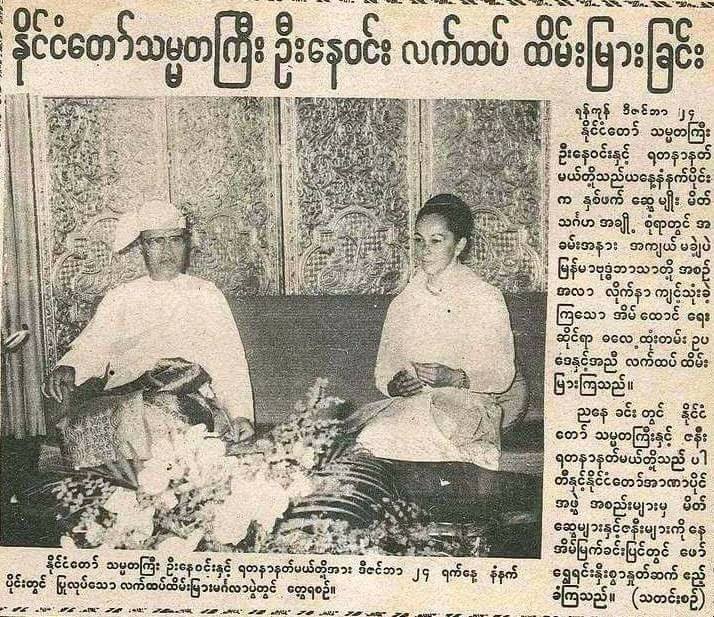June Bellamy, also known as Yadana Nat Mei, a descendant of a Myanmar prince and a former wife of dictator General Ne Win, passed away on Tuesday. To mark her passing, The Irrawaddy revisits this interview with her from September 2019, in which she discusses her royal heritage, exile in India, life in the dying days of the Ne Win regime and her love of cooking.
In Florence, I was lucky to meet June Rose Bellamy, also known as Yadana Nat Mei, Goddess of the Nine Jewels. June is a surviving princess of an ancient Myanmar monarchy and today, at age 87, she runs a cooking school out of her home in Italy to help pay the rent. Although she has never slept on a hundred mattresses or been bruised by a single pea—the litmus test for a “real” princess in fairytale lore—she is the granddaughter of one of the last great Myanmar royals, Prince Linbin Mintha. She traces her glamorous history back to the 1880’s, before the British conquered Myanmar and put an end to royal rule.

I had a personal reason to meet June Bellamy. She was fourth wife of General Ne Win, the dictator whose repressive socialist regime once placed my late Myanmar grandfather, a founder of the democracy movement, under house arrest in Yangon. Ne Win had been a family friend when June was a young girl. They’d lost touch, but then she married him.
Marry the man who would become known for leading Myanmar into international isolation and financial ruin? There appeared a huge disconnect between June’s early background and her marital choice. I was fascinated.
We arranged to meet at her home in the San Frediano neighborhood of Florence. I offered to take her to lunch at a favorite restaurant.
“A presto!” she said on the phone. “See you soon.”
Italy was in the midst of a summer heat wave, yet June looked cool as a cucumber, answering her door with a welcoming smile. She was attractive and petite, dressed in Myanmar style. Her hair, worn fashionably short, had a carefree look, grey with a natural wave. Her manner was lively and confident.
June couldn’t have known how much she resembled my Aunt Margie and also my late mother, Laura, both, like her, of half-western, half-Myanmar heritage—or that I felt fraudulently and immediately at home. Her living space appeared larger than it actually was, full of light and art and plants, with a spacious kitchen at the back and eastern décor—Myanmar tapestries, lacquerware, brassware, an elephant sculpture, a portrait of her grandparents on the wall.
My goal, during our brief visit, was to explore June’s talent for reinvention. From princess to commoner to First Lady to commoner. What was the secret of her resilience well into her 80s? And about that second husband?
Over pre-lunch aperitifs, I discovered parts of June’s early life. Her royal mother married a dashing Australian racehorse breeder and orchid collector. When June was nine, the Japanese bombed Yangon and the family was forced to flee to India, where they remained for five years. June’s exile wasn’t all hardship. She remembers playing on the swings under the watchful eye of Indira Ghandi, whom she described as “a beauty.”
After the war, as a teenager, she wrote an essay for a competition called “The World We Want,” sponsored by the New York Herald Tribune, which won a prize to visit the US along with 30 international students. June considers that trip her political awakening because she encountered racism for the first time. She became acutely aware of her own difference, her “occidental orientalism.”
She went on to marry an Italian doctor who worked with the World Health Organization. They lived a peripatetic life, posted in various Asian countries. She became a TV host in the Philippines and took up painting. By then, she was a mother to two sons who were attending private school in Florence, where she settled after she divorced their father.
In her mid-forties, a life-altering and potentially history-making challenge presented itself. General Ne Win, the old chum and then-military ruler of an isolated Myanmar, reappeared.
A recent widower, he was visiting Europe. When he proposed marriage, June saw opportunity. It was no story-book romance but Ne Win would gain a royal connection while June would reconnect with her country.
As first lady, she believed she could influence Myanmar’s future and help the people. That, she says, was her motivation.
She now refers to that assumption as a “a sin of pride.”

June’s move back to Myanmar came when Ne Win’s power was in decline. She had miscalculated both his character and her potential role: others were manipulating in the wings. The marriage was doomed. After five months, it ended in a dustup she left to my imagination. (Asked to write her memoirs, she has so-far refused.)
Back in Italy, she needed a job, a way to support herself. That’s when her best chapter began.
She guided me to her parked car, where she took the wheel and plunged fearlessly into the Florentine traffic. We enjoyed a delicious lunch at a rooftop restaurant called Sesto on Arno, with a 360-degree view of Florence and where the staff knows her. There, June tells me about the one love affair in her life which lasted: the one with food.
A close friend reminded her how much she loved cooking. Maybe she could earn a living doing what she loved?
“Something clicked,” June said. As a kid, she liked to hang out with the Hindu cook, watch him prepare meals. She’d always been fascinated by food culture in the countries she’d visited with her first husband.
Not one to do things by halves, she flew to London to study with Master chef Kenneth Lo, a name synonymous with Asian cuisine. She returned to Florence to open a cooking school based on her signature style.
She has since written cookbooks, including The Soul of Spice, featured at the 2017 Turin Book Fair. She teaches to supplement her pension. She still paints (recently a whimsical hotel mural) and has a project simmering based on food choices of historic Italians such as Leonardo, Dante and Catherine de Medici. She seems content.
I asked her to play a kind of Proust’s questionnaire.
“Of course,” she agreed.
“Are you ever bored? Isn’t that something we fear as we age?”
June laughed.
“But darling, I don’t have time to be bored!” she said.
“Do you have a cooking secret?”
“In my classes, I have never repeated a dish. It’s my point of pride.”
“To cook well, I see what I have in the kitchen,” she said. “It depends on how I feel and what I see, what the morning brings. Maybe I see a fish, or I see someone coming back from market with radishes. I can get inspired by fresh radishes!”
She recommends only eating things in season.
“Your body doesn’t need pineapples in winter, it needs butter and cream. These days we are too speeded up, we stretch human adaptability,” she said.
“What is your favorite city?”
“Naples,” she replied, her first husband’s hometown. She has a visceral love for the city because it personifies the whole of humanity—the invading Greeks, the Egyptians, the complex cultures that contributed to the magic that is Naples.
“What are the beliefs that sustain you?”
“I am Buddhist,” she said. June meditates daily, though she also drinks wine. She believes in living in the moment: “If you find yourself on the tail of a tiger, hang on for the ride.”
After lunch, June drove me up a twisting mountain road to her favorite Romanesque church, San Miniato al Monte, which overlooks Florence. We encountered a circle of meditators in a courtyard. Hadn’t we just been talking about Buddhism and meditation moments earlier? June smiled at the coincidence.
“No comment,” she whispered, as we slipped by.
Almost home, both of us wilting from the heat, June parked the car. We were walking past a water fountain when she stopped, went back, dipped her hands in the fountain and vigorously splashed her face. She was like a child, mindless of hair or makeup.
“Ah,” she sighed, savoring the relief of cold on her skin.
Wow, good for you, I thought, marveling at her egoless abandon. I also said it out loud.
“Well, why not?” June Bellamy asked with the confidence that comes from having lived a full life.
For me, this is her pea moment—the test of a real princess—and she’s passed.

















